
views
Writing a Personal Statement for an Application

Determine the audience. Depending on what you are applying for, the information you include in your personal statement will differ, often significantly. In order to ensure that you address pertinent subjects, you will want to know who you are writing for. You should consider whether your application will be read by a medical or law school review board, or a graduate committee. Is it an application for a scholarship or an internship? Reflecting on your audience will help you determine what life stories to highlight. For example, if you are applying to get into medical school and a graduate program in English somewhere else, you will want to avoid spending a lot of time highlighting your extensive medical knowledge in the English application or your remarkable writing skills in the medical school application. Although a review committee might be impressed that you have such diverse interests, they also want to make sure that you have the requisite knowledge to be in the program.
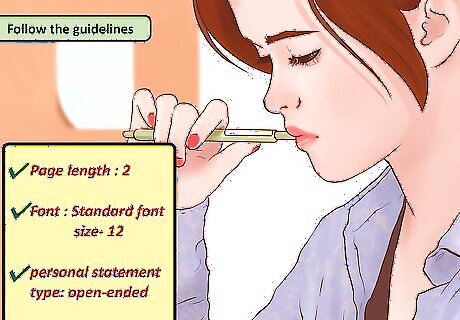
Follow the guidelines. Generally, an application will give you guidelines to follow when writing your personal history. These tend to include things like page length and font size. However, they can also include specific questions that the review committee wants answered. If you are asked specific question, be sure to fully answer them. It is important that the committee sees that you are capable of following directions. However, this does not mean that your statement should be formulaic or bland. Follow the guidelines, but give your readers something exciting or memorable to take away from your letter. In general medical and law schools ask for a more open-ended personal statement. One the other hand, business and graduate schools tend to ask specific questions. However, each application is different and has it owns guidelines, so be sure to follow those.

Develop a theme. Think about the overall story that you are trying to tell the people who will read your application. What impression of you do you want them to take away from it? If you want to them to think that you are intelligent and capable, discuss moments in your life that demonstrate your intelligence and capability. Determine what you are trying to convey and stick with it throughout the essay. Avoid going off on tangents. Consider whether or not a certain topic fits in your overall theme. If it does not, do not include it.
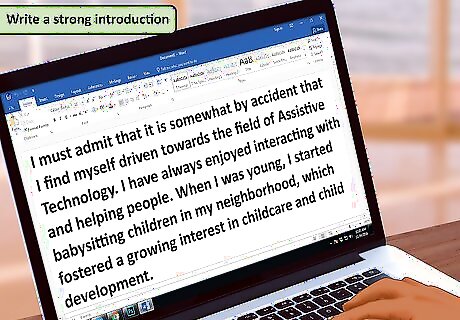
Write a strong introduction. Depending on what you are applying for, a review committee may receive hundreds of applications a year. You will want your application to stand out, and the best way to do that is by writing a compelling introduction. The initial paragraph should grab your reader’s attention and hold it. One method might be drawing the reader in with an interesting tidbit about yourself that relates to what you are applying for. Find what works for you and feels appropriate for the application. Briefly introduce yourself and then provide the framework that the rest of the essay will follow. Allude to things you will discuss later, but do not give it all away. Avoid clichés like “my names is Steve and I’m applying to join your program” or “Allow me to introduce myself…”

Highlight relevant information. The middle section of the essay is where you detail your interests and experience in the field. Discuss you educational background and any pertinent classes you took. List any practical experience that you have, such as internships, conference attendance or previous employment. These things tell the reviewers that you have the knowledge and the experience necessary to succeed in the field. For example, if you are applying for medical school, list any experience you have volunteering in a clinic or specific pre-med courses that you found particularly interesting. If you are applying for graduate school, be sure to discuss any relevant scholars you like or books you find particularly interesting.
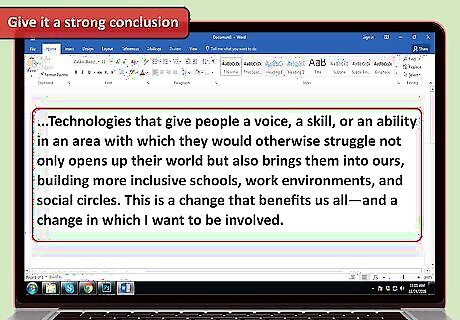
Give it a strong conclusion. Once you have highlighted all of your important education and experience, wrap up the essay with a strong yet concise conclusion. Tell the reader how all of the events listed in your essay have collectively impacted you and shaped you into a strong candidate for what you are applying for. Avoid clichés like “thank you for taking the time to consider my application” or “It is my sincere hope that you will grant me the opportunity to attend your school.”

Proofread. Before you send your materials, be sure to give them a final read. Check for any spelling errors or typos. Make sure that you fully answer the questions asked and meet all of the guidelines. A personal statement full of errors will make it appear as if you do not care and are unprofessional. You can also ask someone else to proofread your essay for you. It is often hard for most people to adequately proofread their own writing, so finding someone to read your statement will likely make it better.
Creating Your Own Personal History
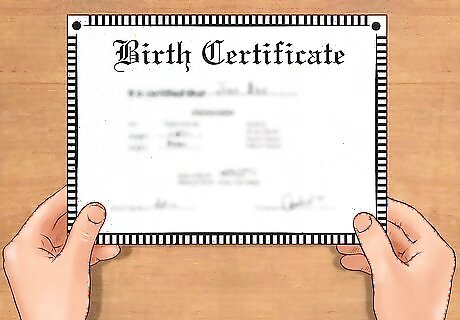
Find important documents. Before you begin writing your personal history, you will want to research and find all of the necessary documents you will want to use. Although your memory will supply much of the material, documents from your past might provide further information or insights. Talk with your friends or family members about any materials that might be useful, such as pictures, government documents, or family papers. Some examples of important documents might be your birth certificate, photographs or videos of you, correspondence (letters and emails) with other people, and old social media posts.

Interview people. Talking to the various people in your life is another excellent way to find information to include in your history. Your family members will be particularly valuable sources since they have known you the longest. Be sure to record the interviews for later use. Many cellphones have a recording function that will help you save your interviews.

Review your documents. Once you have conducted your interviews and gathered your materials, you will want to begin reviewing them. Read through the documents you have collected to find important pieces of information that you would like to include in your history. Listen to the recordings or read the transcripts of the interviews you conducted. Use a notebook or word processor to keep track of this information for later use. Try creating a spreadsheet that lists all of the sources that you would like to use. This will help you find them quickly and not lose them.
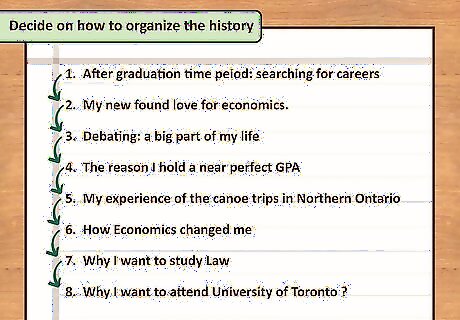
Decide on how to organize the history. Once you have all of your documentation, you will want to begin thinking about how you would like to organize your history. Ask yourself what events you would like to highlight and which are less important. Determine whether you would like to write about your entire life or a specific period. Answering these questions will help you get a better idea of how to organize your story. You can organize your story thematically to emphasize important interests or life lessons. For example, if you want to highlight your skills as an athlete, you may only mention the life events that are relevant to that subject. You can also chronologically format your history to tell a sequential story. Start with the earliest relevant event and move forward in time from there. Ultimately, it is up to you how you organize your story, find a style that makes sense and tells your history.

Begin writing. Once you have a structure for your history, you will want to begin writing it. Initially, this can be an intimidating prospect. In order to make the process of writing your personal history more manageable, try to write a little every day. If you focus on achieving small goals, over time you will finish your history. Try setting a timer for 45 minutes and write until it goes off. Then, take a 15 minute break and start writing again once those 15 minutes are up. Repeat this process as long as you feel fresh and engaged in your writing. Find a writing schedule that works best for you.
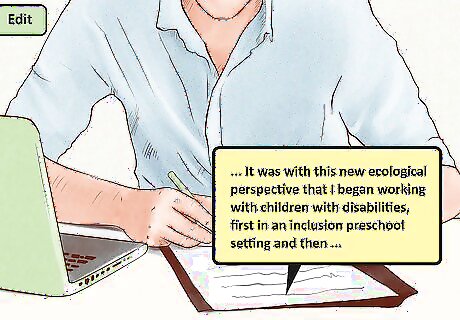
Edit your history. When you have finished writing your history, you will want to edit it. Initially, read it yourself to clean up any typos or errors in the writing. After you have given it a glance, find someone to edit it further. This can be anyone who you trust to do a thorough job of editing. If the story has any juicy details, it should also be someone who you feel comfortable reading it. Although you do not have to accept their edits, it is important to give them a good consideration. If you are publishing your personal history, you will have to work with an editor to get your manuscript ready for publishing. In this circumstance, the editor’s comments often need to be addressed in the manuscript.
Developing Good Writing Habits

Brainstorm and freewrite. Before you begin writing your history, think of what things you would like to discuss in your personal history. Try discussing those ideas with a friend or family member. You can also freewrite them in order to better flesh out the ideas on paper. Just sit down and start writing about yourself. There are no limits when it comes to brainstorming and freewriting. Just be creative and explore different organizational and thematic options. A journal might be useful for freewriting. It will allow you to jot ideas down if you are on the go.
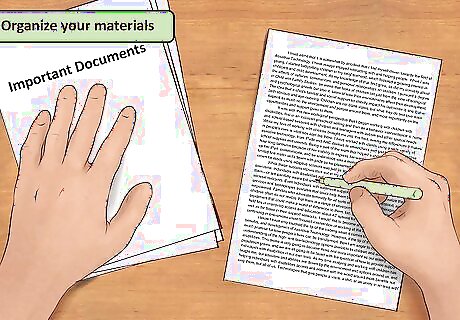
Organize your materials. Once you finish brainstorming, gather any materials you might need. These can include letters of reference or your grades for your personal statement, or historical documents for a larger personal history. Since you will likely have to consult them regularly, make sure that these materials are easily accessible during your writing process. Keep your documents in a digital spreadsheet for quick reference. You could also organize them in folders if that is more convenient.
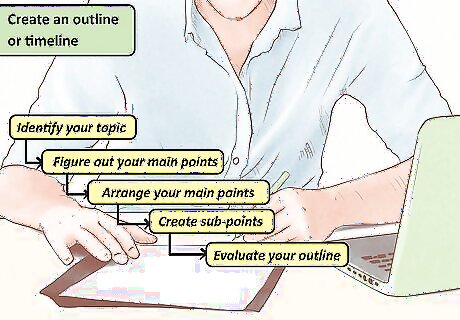
Create an outline or timeline. Before you begin the writing process, write down an outline or a timeline of your history. An outline may be more useful for a personal narrative and a timeline for your personal history. Be sure to highlight any important events or relevant information. Think of the activity like a brainstorming exercise where you are trying to promote creativity, except that your trying to impose more structure on the project. Consider sharing your outline or timeline with someone who you believe will give you good feedback.
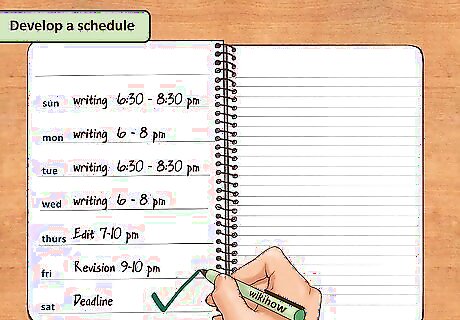
Develop a schedule. If you have a solid deadline for completing your writing, it is important that you plan for meeting that deadline. The best way to do that is to create a schedule and stick to it. Set aside a certain amount of time each day for writing. This will help you meet your deadline and stay motivated.

Find a place where you feel creative and motivated to write. You space significantly impacts your ability to write. Be sure to find a space where you can focus and concentrate on your work. Try finding somewhere that is quiet, secluded and inspires your creative juices. Avoid loud and busy spaces. These can be audibly and visibly distracting. Although it might be cool to work in a coffee shop, it is not an ideal place to write.




















Comments
0 comment